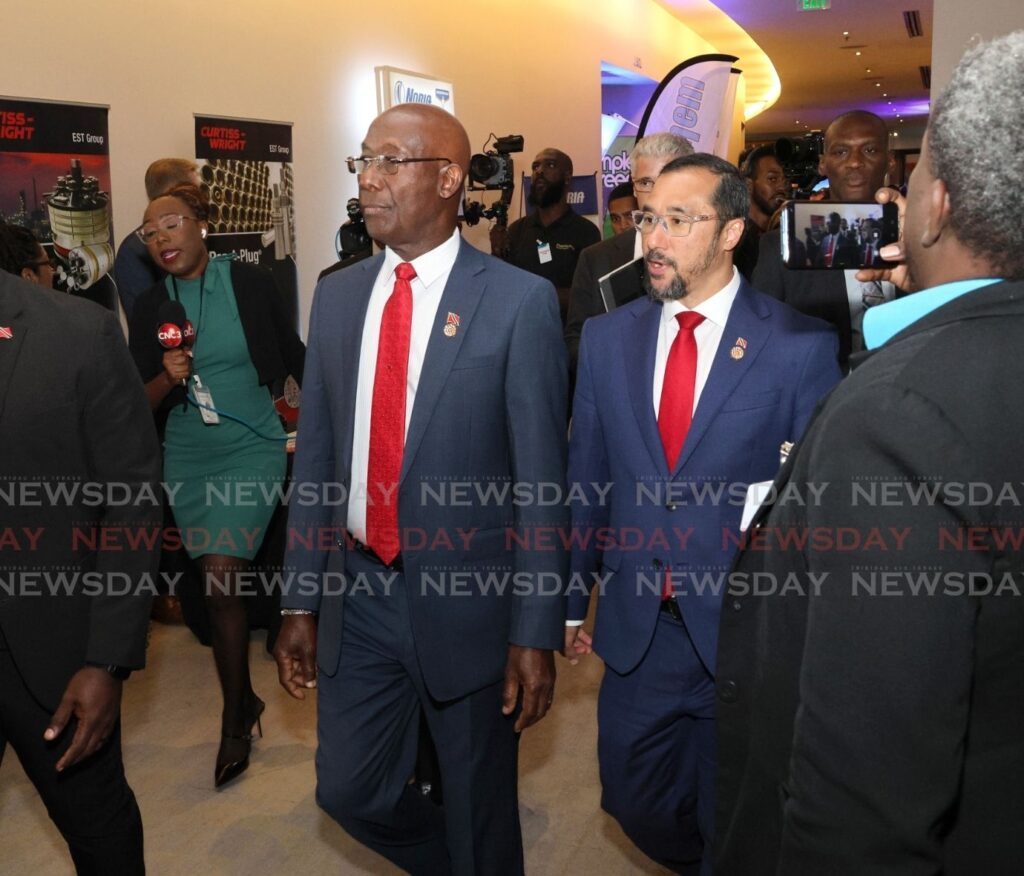Stakeholders optimistic Trinidad and Tobago's energy industry lives on

Dr Thackwray “Dax” Driver was all smiles at the end of the second day of TT Energy Conference 2025, the major part of the conference held from February 10-12 at the Hyatt Regency in Port of Spain.
Speaking to an audience of energy-sector professionals and stakeholders, Driver, the Energy Chamber CEO summed up his thoughts on the overarching theme of the conference.
He explained that he usually meditates on statements and quotes that stick with him, which would describe the conference for him in a nutshell.
This year he took a comment from one of the members who posted on Linked-in during the conference.
“It starts with the quote: ‘Reports of my death are gravely exaggerated.’ It’s a quote from Mark Twain.
“I think that perhaps sums up my view on this conference. That the reports of the death of TT’s energy sector are gravely exaggerated.”
Driver was not the only one to express his confidence in the sector. From the Prime Minister, to the Minister of Energy, Stuart Young, and several panellists, almost every stakeholder in the energy sector spoke of how well-developed the industry is.
Based on the comments and conversations at the conference it was clear that despite the criticism coming from different areas, those in the energy sector believe it not only has life but is poised to flourish in a few years.
Signs of life
A confident Young, in his keynote address on February 10, said TT’s activities in the exploration and production of crude oil and condensate are anticipated to see growth.
He shared statistics saying as of 2024 TT produces an average of 50,357 barrels of oil per day but expects it to leap to 81,773 barrels a day in the next three years.
“The increase in production will be driven substantially by the increase in condensate, primarily from bpTT’s Cypre and Ginger gas fields.
He added that bpTT’s joint venture with EOG in the Mento and Coconut gas fields will add to condensate production.

Natural-gas condensate, also called natural-gas liquids (NGL), is a low-density mixture of hydrocarbons that are present in the raw natural gas produced in many fields.
He added that oil production will increase owing to Heritage’s new drilling projects and workovers (replacing hardware to extend the life of oil wells), pointing out a four-well drilling campaign for the Soldado East field, offshore on the southwest coast of Trinidad.
Oil was first discovered there in 1953 and first production began in 1957.
He added that Perenco is expected to increase production with its new 37 km, 10-inch pipeline from the Teak Alpha, a platform in the Teak field off Trinidad’s southeast coast.
“We have also been putting pressure on Heritage to partner with those companies in the industry that have the ability, experience, equipment, wherewithal and appetite to drill and produce oil,” Young said
He said an energy outlook by energy research and business intelligence company Rystad Energy indicated that investment in deep-water projects were expected to increase by three per cent, with Guyana, Suriname, Mexico and Turkey propelling the growth in investments. He added that global demand for liquids is expected to increase as well, to one million barrels a day.
“NGL and other liquids are expected to contribute an additional growth of over 300,000 barrels per day next year,” Young said. “This demand will be influenced by significant technological and fundamental global trends that are expected to affect the international energy markets in the upcoming year.”
Dr Rowley, in his keynote speech on February 10, highlighted that the oil and gas industry remains a cornerstone of the global energy supply, with US-based consulting and strategy firm Mc Kinsey and Company projecting oil, natural gas and coal to continue to play a significant role in the world’s energy system up to the year 2050. Mc Kinsey added that investment and capital into fossil fuels would be needed for at least the next decade to ensure that the global energy system keeps up with growing demands.
“Offshore drilling in particular is projected to play a significant role in global energy supply,” Rowley said. “Next-generation drilling platforms will offer faster set-up and fewer emissions.”
He said global investment in offshore drilling is projected to increase from US$43 billion in 2025 to US$ 64 billion by 2030.
“One notable trend in the ongoing offshore revolution is a large increase in deep-water and ultra-deep-water drilling.”
TT is seemingly pouncing on this opportunity as it officially launched its deep-water bid round on the first day of the conference.
The permanent secretary in the Ministry of Energy, Penelope Bradshaw-Niles, in a presentation said there were 26 blocks for bid in TT’s deep-water regions off the northern and eastern coasts of TT.
“As it stands TT’s deep-water province is largely unexplored, but coming into view,” Rowley said. “We stand to gain from the increase in exploration in deep water, globally.”
Facing new challenges
Country manager of Woodside Energy Kellyann Lochan pointed out the challenges that TT may face as it embarks on deep-water exploration. She said because of the higher risks, it may require higher gas prices and longer contracts to justify investments.
“In shallow water, about 30 metres to a few hundred metres water depth, there are lower development costs and lower operating costs. This is because in shallow water you are benefiting from fixed platforms and usually extensive pipeline infrastructure. These reservoirs are predictable, well understood and usually mature oil and gas fields.
“In contrast in deep water, which is 400 metres and ultra-deep water which is upwards of 2,000 metres depth, there will be a lot more capex, a lot more development costs and a lot more operating costs.
“This is generally because of complex drilling, the need for sub-sea infrastructure in some cases and the need for floating production systems – much more expensive than fixed facilities.
“Generally these developments overall have more complex sub-surface risks and operability risks.”
But the ease of doing business in TT’s energy sector is quite high, according to senior vice president and country chair of Shell TT Adam Lowmass.
“From a regulatory environment and ease of doing business perspective, TT is up there with some of the best places I’ve ever had the opportunity to work in.
“Over the last couple of years, being able to partner with members of this community as well as the government regulators, I think the ease of doing business is quite high in comparison to other places.
He said while there may be a need to address challenges in meeting costs of doing business, TT cannot stay still as it continues to think about investing in the future of the industry and the country.
“We have heard a number of people talk about the change in the energy mix, the change of the type size and location of reservoirs, so the need to change and evolve the regulatory and the different ways of doing business are paramount."
He lauded the government and supporting agencies such as the Environmental Management Authority (EMA) for having a sense of continuous improvement.
“There really is a desire to learn, evolve and transform the way that they enable us to do our work. That is going to be important as we go through changes in the way business is being done.
TT should have more confidence
David Campbell, the bpTT president, in a panel discussion on investing in the energy sector on February 10, said TT should have more confidence in its capabilities because it has a lot going for it. As such, TT needs to accelerate its pace of development to become more competitive.
“We are competing with other potential investments around the world, but would have a lot more confidence in TT.
“We have 50-60 years of experience working offshore, a very good track record, some of the greatest geology and we have great people at bp and other service companies and other producing companies. That should give us the confidence to go forward.”
“We really need to move quicker,” he added, admitting that the oil and gas giant is as much at fault for the pace of production as other stakeholders. He noted that the balancing act between accelerating growth and mitigating risk is something that bpTT continually works on.
“One of the things we work on within our company is to make sure the rules and checks that we have are equal to the risks.”
He said investments into deep water exploration and production will be higher and so too will be the risks, but for smaller pockets in the nearshore and onshore faster action has to be taken.
He lauded the government’s efforts in shortening the timeframe for approvals for production sharing contracts and downstream companies for innovation and the development of technology in the sector.
He said foreign investment must see aggressive progress.
“You need to see drilling rigs, you need to see work going on,” he said.
He also noted that declines in production is normal, pointing out that gas reservoirs can deplete at a rate of about 20 per cent a year if all a company does is produce from that field. He said adding reserves and continual exploration is needed to offset the decline.
RBC Financial CEO Darryl White also noted that local investment is also high but some people may only consider what he called financial capital as capital investment.
“One of the myths that we have to bust is that there isn’t a lot of capital in the TT energy industry but there actually is quite a lot. Once upon a time it was just people renting houses to expats and so on. When energy companies, the large ones for instance, rent buildings, employ people, there is so much going on that has capital being invested.”
Rowley was one of the first to express this confidence in the energy industry, even as he reminded the audience of his impending exit from politics. He said TT’s energy sector is seeing a resurgence through the new wave of exploration and development activity.
“The ongoing activities in the upstream sector, encompassing onshore, shallow water and deep-water regions in TT, as well as the cross-border marine area in Venezuela, are unparalleled and augurs well for the future of the industry.
“It speaks volumes to this government’s unwavering commitment to place the energy sector on a sound footing as well as the confidence that stakeholders have had in measures taken by the government to turn around the industry.
“Therefore, as I depart from office I feel a sense of achievement in having my team address the challenges we encountered upon my arrival in 2015 and I am optimistic about the future of the energy sector.”

Comments
"Stakeholders optimistic Trinidad and Tobago’s energy industry lives on"